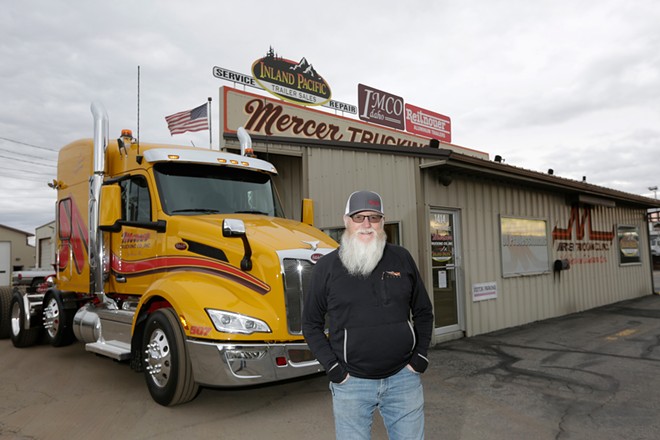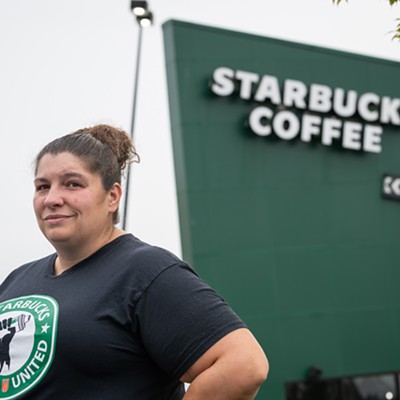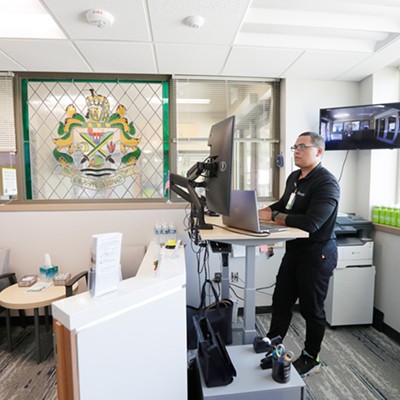
People in the trucking industry are proud to say that if you ate it, bought it, or saw it at a store, it most likely got there by truck.
Nearly three-quarters of America's freight (by weight) is shipped to its final destination by truck, according to data compiled by American Trucking Associations, a national organization that includes all 50 state trucking organizations.
"Factually, 80 percent of communities in Washington rely solely on trucks to deliver their goods," says Sheri Call, president and CEO of Washington Trucking Associations, which includes underlying "conferences" of niche groups, from dump truck drivers to common carriers. "You don't see a train parked behind your grocery store."
So when there's an estimated shortage of about 80,000 drivers, the nation feels the crunch.
West Coast ports have also seen a 30 percent increase in shipments, with Seattle and Tacoma working through a backlog that's currently keeping seven container ships at any given time anchored and waiting for the chance to unload, explains Melanie Stambaugh, spokeswoman for the Northwest Seaport Alliance, which manages marine cargo there.
Truck drivers are also waiting in long lines to get in and out of the marine loading areas, she says, even though other loading locations are being added to reduce the congestion.
"Where a trucker has been able to, in years past, do three or four turns or pickups in a day, they're now only able to do two," Stambaugh says.
That can make a big difference for drivers who are paid per load.
Really, the whole supply chain is stressed. Some warehouses don't have enough forklift drivers to help load and unload trucks. Some manufacturers weren't able to keep pace with demand until recently, and now they're competing for the same trucks and equipment to get their goods to customers.
But while the pandemic has exacerbated issues across the board, the trucking industry has had issues with driver shortages for decades, Call says. She's been around the Washington trucking organization for 18 years and says the topic comes up nearly every year.
Many drivers currently on the road are aging. The majority of drivers are between the ages of about 49 and 54, Call says, and there aren't enough young people clamoring to fill those jobs.
"Those folks, as they're retiring, are not being replaced by incoming drivers," Call says.
One issue is that young people who want to start a career in truck driving are limited. If you're 18 to 20 years old, you can get a Commercial Driver's License and haul loads within your state, but you can't cross state lines.
That makes for the odd scenario where a 19-year-old could haul goods from Coeur d'Alene to Twin Falls, Idaho, but not from Coeur d'Alene to Spokane, says Allen Hodges, president and CEO of the Idaho Trucking Association.
"Those folks, as they're retiring, are not being replaced by incoming drivers."
tweet this
Many in the industry hope that particular federal regulation will soon change. The Infrastructure Investment and Jobs Act included a pilot project to train 3,000 young drivers between 18 and 20. The young truckers will be allowed to drive across state lines so long as there are certain safety measures on their trucks and mentor/apprentice guidelines are followed.
"It'll be a much more intense mentoring program to prove that the right 18-year-old can operate safely. It's not for everybody, we agree," Call says. "The DRIVE-Safe Act was developed and created in collaboration with the insurance industry."
Hodges says he also hopes to encourage more high school students to consider a career in trucking by touring to different schools with a simulator so students can see what it feels like to be behind the wheel.
"The industry is trying to let people know that the image of trucking is way different nowadays," Hodges says, noting that more women and minorities are drivers than in the past. "It's more welcoming and, I would say, accommodating all around."
In the past, some truckers have struggled with the commitment to be on the road for long periods of time, while others have seen a lack of support at larger companies.
Steve Hanning, owner of Mercer Trucking Company, says he's run the company with an eye on supporting his drivers. They operate about 15 flatbed trucks out of Spokane Valley, working across the western U.S. and Canada.
"I make sure my employees are home every weekend and don't have to work," Hanning says. "I want them to be involved with their family as much as they can."
He thinks one of the reasons it's sometimes hard to find people with at least three years of experience to join his company is that some companies make promises they don't keep.
"I think there's a lot of trucking companies out there that have told their drivers they're going to get this or that and it doesn't happen," Hanning says. "So when a guy comes in here, and we tell them all the stuff I think they walk out the door sometimes and go, 'That can't be true.'"
But there really are a lot of incentives to get into the industry, experts say. On top of competitive pay and sign-on bonuses being offered right now, more and more companies are moving to shorter trips to enable that work-life balance.
"I think what we're seeing is trends in hauls getting shorter," Call says.
Overall, Call says she hopes that other people see the professionalism of the workers within the industry and remember the importance of trucking to their lives.
"Without trucks, society would fail to function," she says. ♦






























